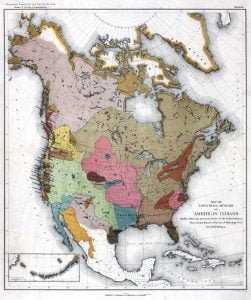Indian Tribes of the United States: The largest online collection, providing the history, location, customs, and society, of each Native American tribe.
AccessGenealogy offers an extensive cross-reference of our tribal pages, allowing for a more streamlined research experience. Previously, we provided a comprehensive list of resources for each tribe in the United States. However, we have now shifted to a cross-reference system, where these resources can be found directly on the tribal pages. This approach enables us to focus on providing more accurate tribal spellings while still directing you to the relevant tribal page.
Each tribal page includes a description of the tribe, information on the villages where the tribe resided, details about the gens and clans, culture, religion, and references to other works available on our website. By utilizing this comprehensive resource, researchers can access a wealth of information about Native American tribes and their histories.
Tribe Histories and Genealogy
- Indian Tribal Histories Abenaki to Awatobi
- Indian Tribal Histories Bannock to Brotherton
- Indian Tribal Histories Caddo to Cupeno
- Indian Tribal Histories Dakota to Dwamish
- Indian Tribal Histories Eno to Eyeish
- Indian Tribal Histories Fernandeno to Freshwater
- Indian Tribal Histories Gabrielino to Guasas
- Indian Tribal Histories Haida to Huron
- Indian Tribal Histories Ibitoupa to Isleta del Sur
- Indian Tribal Histories Jeags to Juaneno
- Indian Tribal Histories Kadohadacho to Kwalhioqua
- Indian Tribal Histories Lakniut to Lutuamian
- Indian Tribal Histories Macapiras to Munsee
- Indian Tribal Histories Nabedache to Ntlakyapamuk
- Indian Tribal Histories Ocale to Ozette
- Indian Tribal Histories Paiute to Puntatsh
- Indian Tribal Histories Quahatika to Quinipissa
- Indian Tribal Histories Rogue River
- Indian Tribal Histories Saconnet to Swinomish
- Indian Tribal Histories Tacatacuru to Tyigh
- Indian Tribal Histories Ucita to Utina
- Indian Tribal Histories Waccamaw to Wynoochee
- Indian Tribal Histories Yahi to Zuni
Tribal information extracted from the following manuscripts (Just click on the author’s name to view what they have written on a tribe) :
- The Handbook of American Indians North of Mexico was compiled by some of the best and well known Indian researchers of that time. Many of which wrote only about specific tribes. The work began in 1873 and was submitted to the Bureau of Ethnology for publication in 1905. There are approximately 2,500 tribes listed in the book, most of which you will find on our pages listed as Indian Tribal Histories or Indian Bands, Gens and Clans
Because this book is so extensive we have included other sections which we felt would be of interest to our readers: Indian History, Indian Facts and Fallacies, Indian Chiefs and Leaders, Indian Reservations, and Indians of Canada and Mexico (in progress). - Villages of the Algonquian, Siouan and Caddoan Tribes West of the Mississippi by David Bushnell. Bushnell paints a vivid picture of the homes, camps and travels of our Indian Ancestors.
- The Aboriginal Races of North America by Samuel G. Drake, provides the reader with an enumeration of the tribes known at that time and endeavors to divide North America into certain districts, each which include all Indians speaking the same or dialects of the same language.
- The Indian Tribes of North America, by John R. Swanton, the author divides the United States by regions and places the many tribes in that area. This work is not completely accurate and many of the tribes moved in a wide area especially for hunting and winter camps. This book provides more information than just the history of the tribes, we have made pages that contain additional information. We have also built pages that will provide you links to other pages on our site that contains additional information on specific tribes (some still in progress). If you use the search on Access Genealogy, using terms like Tribal names, Indian Dance, Indian Customs and more, you will find pages within books on that subject. Be sure to put the specific tribe in your search like Blackfoot Indian Customs.
- A Guide to Tracing American Indian & Alaska Native Ancestry
When establishing descent from an American Indian/American Native tribe for membership and enrollment purposes an individual must provide genealogical documentation that supports his or her claim of such ancestry from a specific tribe or tribal community. Such documentation must prove that the individual is a lineal descendant of an individual whose name can be found on the tribal membership roll of the federally recognized tribe from which the individual is claiming descent and is seeking to enroll.

